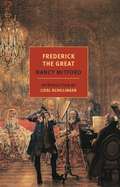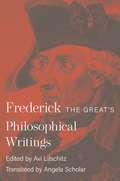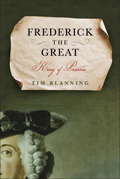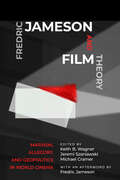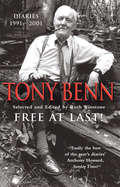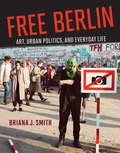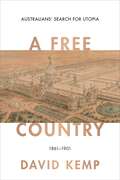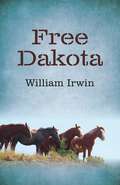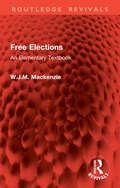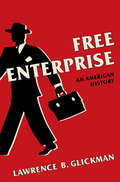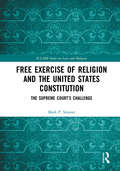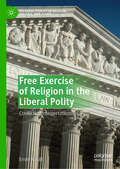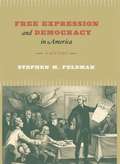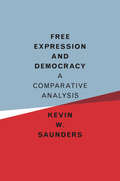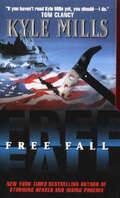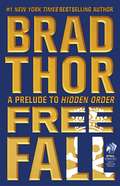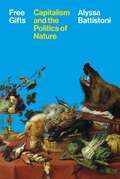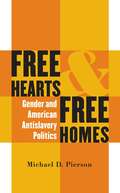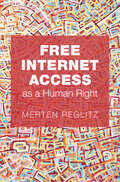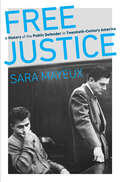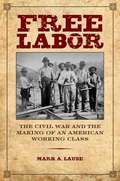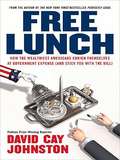- Table View
- List View
Frederick the Great
by Nancy Mitford Liesl SchillingerThe Prussian king Frederick II is today best remembered for successfully defending his tiny country against the three great European powers of France, Austria, and Russia during the Seven Years' War. But in his youth, tormented by a spectacularly cruel and dyspeptic father, the future military genius was drawn to the flute and French poetry, and throughout his long life counted nothing more important than the company of good friends and great wits. This was especially evident in his longstanding, loving, and vexing relationship with Voltaire. An absolute ruler who was allergic to pomp, a non-hunter who wore no spurs, a reformer of great zeal who maintained complete freedom of the press and religion and cleaned up his country's courts, a fiscal conservative and patron of the arts, the builder of the rococo palace Sans Souci and improver of the farmers' lot, maddening to his rivals but beloved by nearly everyone he met, Frederick was--notwithstanding a penchant for merciless teasing--arguably the most humane of enlightened despots.In Frederick the Great, a richly entertaining biography of one of the eighteenth century's most fascinating figures, the trademark wit of the author of Love in a Cold Climate finds its ideal subject.
Frederick the Great's Philosophical Writings
by King Frederick IIThe first modern English edition of diverse Enlightenment-era writings by Prussian monarch Frederick the GreatFrederick II of Prussia (1712–1786), best known as Frederick the Great, was a prolific writer of philosophical discourses, poems, epics, satires, and more, while maintaining extensive correspondence with prominent intellectuals, Voltaire among them. This edition of selected writings, the first to make a wide range of Frederick’s most important ideas available to a modern English readership, moves beyond traditional attempts to see his work only in light of his political aims. In these pages, we can finally appreciate Frederick’s influential contributions to the European Enlightenment—and his unusual role as a monarch who was also a published author.In addition to Frederick’s major opus, the Anti-Machiavel, the works presented here include essays, prefaces, reviews, and dialogues. The subjects discussed run the gamut from ethics to religion to political theory. Accompanied by critical annotations, the texts show that we can understand Frederick’s views of kingship and the state only if we engage with a broad spectrum of his thought, including his attitudes toward morality and self-love. By contextualizing his arguments and impact on Enlightenment beliefs, this volume considers how we can reconcile Frederick’s innovative public musings with his absolutist rule. Avi Lifschitz provides a robust and detailed introduction that discusses Frederick’s life and work against the backdrop of eighteenth-century history and politics.With its unparalleled scope and cross-disciplinary appeal, Frederick the Great’s Philosophical Writings firmly establishes one monarch’s multifaceted relevance for generations of readers and scholars to come.
Frederick the Great: King of Prussia
by Tim BlanningThe definitive biography of the legendary autocrat whose enlightened rule transformed the map of Europe and changed the course of history Few figures loom as large in European history as Frederick the Great. When he inherited the Prussian crown in 1740, he ruled over a kingdom of scattered territories, a minor Germanic backwater. By the end of his reign, the much larger and consolidated Prussia ranked among the continent's great powers. In this magisterial biography, award-winning historian Tim Blanning gives us an intimate, in-depth portrait of a king who dominated the political, military, and cultural life of Europe half a century before Napoleon. A brilliant, ambitious, sometimes ruthless monarch, Frederick was a man of immense contradictions. This consummate conqueror was also an ardent patron of the arts who attracted painters, architects, musicians, playwrights, and intellectuals to his court. Like his fellow autocrat Catherine the Great of Russia, Frederick was captivated by the ideals of the Enlightenment--for many years he kept up lively correspondence with Voltaire and other leading thinkers of the age. Yet, like Catherine, Frederick drew the line when it came to implementing Enlightenment principles that might curtail his royal authority. Frederick's terrifying father instilled in him a stern military discipline that would make the future king one of the most fearsome battlefield commanders of his day, while deriding as effeminate his son's passion for modern ideas and fine art. Frederick, driven to surpass his father's legacy, challenged the dominant German-speaking powers, including Saxony, Bavaria, and the Habsburg Monarchy. It was an audacious foreign policy gambit, one at which Frederick, against the expectations of his rivals, succeeded. In examining Frederick's private life, Blanning also carefully considers the long-debated question of Frederick's sexuality, finding evidence that Frederick lavished gifts on his male friends and maintained homosexual relationships throughout his life, while limiting contact with his estranged, unloved queen to visits that were few and far between. The story of one man's life and the complete political and cultural transformation of a nation, Tim Blanning's sweeping biography takes readers inside the mind of the monarch, giving us a fresh understanding of Frederick the Great's remarkable reign.
Fredric Jameson and Film Theory: Marxism, Allegory, and Geopolitics in World Cinema
by John Mackay Dudley Andrew Jeremi Szaniawski Fredric Jameson Pansy Duncan Michael Cramer Paul Coates Dan Hassler-Forest Naoki Yamamoto Mike Wayne Keith B. Wagner Alvin K. Wong Mercedes VazquezFrederic Jameson and Film Theory is the first collection of its kind, it assesses and critically responds to Fredric Jameson’s remarkable contribution to film theory. The essays assembled explore key Jamesonian concepts—such as totality, national allegory, geopolitics, globalization, representation, and pastiche—and his historical schema of realism, modernism, and postmodernism, considering, in both cases, how these can be applied, revised, expanded and challenged within film studies. Featuring essays by leading and emerging voices in the field, the volume probes the contours and complexities of neoliberal capitalism across the globe and explores world cinema's situation within these forces by deploying and adapting Jamesonian concepts, and placing them in dialogue with other theoretical paradigms. The result is an innovative and rigorously analytical effort that offers a range of Marxist-inspired approaches towards cinemas from Asia, Latin America, Europe, and North America in the spirit of Jameson's famous rallying cry: 'always historicize!'.
Free At Last: Diaries 1991 - 2001
by Tony BennTony Benn is the longest serving MP in the history of the Labour Party. He left Parliament in 2001, after more than half a century in the House of Commons, to devote more time to politics. This volume of his Diaries describes and comments, in a refreshing and honest way, upon the events of a momentous decade including two world wars, a change of government in Britain and the emergence of New Labour, of which he makes clear he is not a member. Tony Benn's account is a well documented, formidable and principled critique of the New Labour Project, full of drama, opinion, humour, anecdotes and sparkling pen-portraits of politicians on both sides of the political divide. But his narrative is also broader and more revealing about day-to-day political life, covering many aspects normally disregarded by historians and lobby correspondents, relating to his work in the constituency, including his advice surgeries. This volume also offers far more of an insight into Tony Benn's personal life, his thoughts about the future and his relationship with his family, especially his remarkable wife Caroline, whose illness and death overshadow these years. Tony Benn is a unique figure on the British political landscape: a true democrat, a passionate socialist and diarist without equal. With this volume, his published Diaries cover British politics for over sixty years. It is edited, as are all others, by Ruth Winstone.
Free Berlin: Art, Urban Politics, and Everyday Life
by Briana J. SmithAn alternative history of art in Berlin, detaching artistic innovation from art world narratives and connecting it instead to collective creativity and social solidarity.In pre- and post-reunification Berlin, socially engaged artists championed collective art making and creativity over individual advancement, transforming urban space and civic life in the process. During the Cold War, the city&’s state of exception invited artists on both sides of the Wall to detour from artistic tradition; post-Wall, art became a tool of resistance against the orthodoxy of economic growth. In Free Berlin, Briana Smith explores the everyday peculiarities, collective joys, and grassroots provocations of experimental artists in late Cold War Berlin and their legacy in today&’s city.These artists worked intentionally outside the art market, believing that art should be everywhere, freed from its confinement in museums and galleries. They used art as a way to imagine new forms of social and creative life. Smith introduces little-known artists including West Berlin feminist collective Black Chocolate, the artist duo paint the town red (p.t.t.r), and the Office for Unusual Events, creators of satirical urban political theater, as well as East Berlin action art and urban interventionists Erhard Monden, Kurt Buchwald, and others. Artists and artist-led urban coalitions in 1990s Berlin carried on the participatory spirit of the late Cold War, with more overt forms of protest and collaboration at the neighborhood level. The temperament lives on in twenty-first century Berlin, animating artists&’ resolve to work outside the market and citizens&’ spirited defenses of green spaces, affordable housing, and collectivist projects. With Free Berlin, Smith offers an alternative history of art in Berlin, detaching artistic innovation from art world narratives and connecting it instead to Berliners&’ historic embrace of care, solidarity, and cooperation.
Free Country: Australians' Search for Utopia 1861–1901
by David KempA Free Country: Australians' Search for Utopia 1861-1901 tells how Australians, inspired by their new democracy, attempted to use their freedom to build a society without social and economic conflict. As the second book in a landmark five-volume Australian Liberalism series, A Free Country shows the successes and missteps in the attempt to establish the legal and moral foundations for a liberal society in Australia, examining the ideological battles of the period. The national politics of twentieth-century Australia had their roots during this time, as utopian dreams of 'social reconstruction' opposed liberal ideals of individual freedom, fostering the concept of 'class wars' and leading to the ongoing involvement of trade unions in politics. As emerging collective ideas of nationalism, empire, race and class challenged individual rights and threatened to seed domestic and international conflict, liberals succeeded in bringing the six colonies into one Australian nation founded on liberal principles, writing a constitution hailed as the most democratic in the world.
Free Dakota
by William IrwinDon Jenkins wants a divorce from the United States. He&’s tired of a government that can't balance its budget but thinks it can dictate how much soda he should drink. Combining political intrigue and political theory, Free Dakota explores the new possibilities when Don follows the call of a charismatic diner owner who promises a libertarian paradise on the prairie. After years of struggle they have the votes for a peaceful secession, but the feds say it's 'til death do us part. Stopping the feds may cost more in integrity than in blood, however, when Don has to decide whether to stay after an assassination changes everything.
Free Elections: An Elementary Textbook (Routledge Revivals)
by W.J.M. MackenzieOriginally published in 1958 at a time when many African and Asian nations were newly independent or going through the process of independence, this book sets out the facts and arguments which have to be considered in designing and running electoral systems. The book treats the problems of free elections in Africa and Asia objectively and uncontroversially, without pre-supposing any previous training in political science. The discussion of 'free elections' raises large issues about political norms and ideologies and about the working of political systems in different societies, and the book tackles these questions head on. The book gives a balanced account of the whole issue of elections, covering on the one hand qualifications and voting systems, and on the other hand less ‘political’ questions of administration and control, which are of equal importance in the working of an electoral system.
Free Enterprise: An American History
by Lawrence B. GlickmanAn incisive look at the intellectual and cultural history of free enterprise and its influence on American politics Throughout the twentieth century, “free enterprise” has been a contested keyword in American politics, and the cornerstone of a conservative philosophy that seeks to limit government involvement into economic matters. Lawrence B. Glickman shows how the idea first gained traction in American discourse and was championed by opponents of the New Deal. Those politicians, believing free enterprise to be a fundamental American value, held it up as an antidote to a liberalism that they maintained would lead toward totalitarian statism. Tracing the use of the concept of free enterprise, Glickman shows how it has both constrained and transformed political dialogue. He presents a fascinating look into the complex history, and marketing, of an idea that forms the linchpin of the contemporary opposition to government regulation, taxation, and programs such as Medicare.
Free Exercise of Religion and the United States Constitution: The Supreme Court’s Challenge (ICLARS Series on Law and Religion)
by Mark P. StrasserThe United States is extremely diverse religiously and, not infrequently, individuals sincerely contend that they are unable to act in accord with law as a matter of conscience. The First Amendment to the United States Constitution protects the free exercise of religion and the United States Supreme Court has issued many decisions exploring the depth and breadth of those protections. This book addresses the Court’s free exercise jurisprudence, discussing what counts as religion and the protections that have been afforded to a variety of religious practices. Regrettably, the Court has not offered a principled and consistent account of which religious practices are protected or even how to decide whether a particular practice is protected, which has resulted in similar cases being treated dissimilarly. Further, the Court’s free exercise jurisprudence has been used to provide guidance in interpreting federal statutory protections, which is making matters even more chaotic. This book attempts to clarify what the Court has said in the hopes that it will contribute to the development of a more consistent and principled jurisprudence that respects the rights of the religious and the non-religious.
Free Exercise of Religion in the Liberal Polity: Conflicting Interpretations (Palgrave Studies in Religion, Politics, and Policy)
by Emily R. GillThis book addresses the challenge of providing for the free exercise of religion without allowing religious exercise by some individuals and groups to impinge upon the conscientious convictions of others. State neutrality toward religion is impossible, because neutrality means inattention to religion for some, but leveling the playing field through accommodations or exemptions for others. Both formal and substantive neutrality have a place in addressing particular conflicts. One such example is public funding for religiously affiliated social service programs, for which neither type of neutrality is satisfactory and thus some restrictions are justifiable; conversely, private voluntary organizations that do not receive direct public funding should be allowed wide latitude regarding their practices. This title also examines the expansive free exercise claims that are now made by those who argue that following the law impinges upon their beliefs, as exemplified by the ministerial exception and the Hobby Lobby and Masterpiece Cakeshop Supreme Court cases. It concludes by analyzing the relationship between neutrality and marriage as a civil status, which impacts a variety of commitment types and plural marriage.
Free Expression and Democracy in America: A History
by Stephen M. FeldmanCharting the course of free expression alongside the nation's political evolution, from the birth of the Constitution to the quagmire of the Vietnam War, Stephen M. Feldman argues that our level of freedom is determined not only by the Supreme Court, but also by cultural, social, and economic forces. Along the way, he pinpoints the struggles of excluded groups -- women, African Americans, and laborers -- to participate in democratic government as pivotal to the development of free expression.
Free Expression and Democracy: A Comparative Analysis
by Saunders Kevin W.Free Expression and Democracy takes on the assumption that limits on free expression will lead to authoritarianism or at least a weakening of democracy. That hypothesis is tested by an examination of issues involving expression and their treatment in countries included on The Economist's list of fully functioning democracies. Generally speaking, other countries allow prohibitions on hate speech, limits on third-party spending on elections, and the protection of children from media influences seen as harmful. Many ban Holocaust denial and the desecration of national symbols. Yet, these other countries all remain democratic, and most of those considered rank more highly than the United States on the democracy index. This book argues that while there may be other cultural values that call for more expansive protection of expression, that protection need not reach the level present in the United States in order to protect the democratic nature of a country.
Free Expression, Globalism and the New Strategic Communication
by Monroe E. PriceVast changes in technologies and geopolitics have produced a wholesale shift in the way states and other powerful entities think about the production and retention of popular loyalties. Strategic communication has embraced these changes as stakes increase and the techniques of information management become more pervasive. These shifts in strategic communications impact free speech as major players, in a global context, rhetorically embrace a world of transparency, all the while increasing surveillance and modes of control, turning altered media technologies and traditional media doctrines to their advantage. Building on examples drawn from the Arab Spring, the shaping of the Internet in China, Iran's perception of foreign broadcasting, and Russia's media interventions, this book exposes the anxieties of loss of control, on the one hand, and the missed opportunities for greater freedom, on the other. "New" strategic communication arises from the vast torrents of information that cross borders and uproot old forms of regulation. Not only states but also corporations, nongovernmental organizations, religious institutions, and others have become part of this new constellation of speakers and audiences.
Free Fall
by Kyle MillsFrom the #1 New York Times bestselling author of Vince Flynn's Mitch Rapp SeriesIt's bold. It's dangerous. It's the kind of maverick operation that has made Mark Beamon both the FBI's best agent and its least-likely-to-succeed screw-up.A top-secret FBI file -- buried in an anonymous government warehouse since J. Edgar Hoover's death -- is missing. The unlucky grad student who uncovered it is dead, and now his ex-girlfriend is on the run, accused of the murder. The only man everyone agrees can find the young woman and turn up the explosive document is "off-duty," suspended and under the threat of prosecution by the bureau itself.Beamon knows better than anyone that this is his last shot to save his career -- and his country. Tracking the young woman down, though, will be the hardest assignment he's ever tackled, for she's a gutsy world-class rock-climber who can drop out of sight anywhere in the world. And even if he finds her and the file, who can he trust when the FBI itself is under suspicion? Beamon has no room for wrong guesses -- or moves. If he blows this one, he'll free fall straight out of the bureau -- and straight into prison....
Free Fall: A Prelude to Hidden Order (The Scot Harvath Series #12)
by Brad ThorThe prelude to Hidden Order, Brad Thor's riveting and pulse-pounding Scot Harvath thriller.Experience the suspense and thrills only Brad Thor can write in Free Fall, the shocking prelude to Hidden Order.
Free For All: Why The NHS Is Worth Saving
by Gavin FrancisBritain's health service is dying. Gavin Francis shows us why we should fight for it.Since its birth in 1948, the powers that be have chipped away at the NHS. Now, Britain's best-loved institution is under greater threat than ever, besieged by a deadly combination of underfunding, understaffing and the predatory private sector.In the wake of the pandemic, we have come to accept a 'new normal' of permanent crisis and years-long waiting lists. But, as Gavin Francis reveals in this short, vital book- it doesn't have to be this way, and until recently, it wasn't. Drawing on the history of the NHS as well as his own experience as a GP, he introduces us to the inner workings of an institution that has never been perfect but which transformed the lives and health of millions, for free - and which has never been more important. For those who believe in the future of the NHS and its founding principles, this is essential reading from the bestselling author of Recovery and Intensive Care.
Free Gifts: Capitalism and the Politics of Nature
by Alyssa BattistoniA timely new critique of capitalism&’s persistent failure to value natureCapitalism is typically treated as a force for relentless commodification. Yet it consistently fails to place value on vital aspects of the nonhuman world, whether carbon emissions or entire ecosystems. In Free Gifts, Alyssa Battistoni explores capitalism&’s persistent failure to value nature, arguing that the key question is not the moral issue of why some kinds of nature shouldn&’t be commodified, but the economic puzzle of why they haven&’t been. To understand contemporary ecological problems from biodiversity collapse to climate change, she contends, we have to understand how some things come to have value under capitalism—and how others do not. To help us do so, Battistoni recovers and reinterprets the idea of the free gift of nature used by classical economic thinkers to describe what we gratuitously obtain from the natural world, and builds on Karl Marx&’s critique of political economy to show how capitalism fundamentally treats nature as free for the taking. This novel theory of capitalism&’s relationship to nature not only helps us understand contemporary ecological breakdown, but also casts capitalism&’s own core dynamics in a new light.Battistoni addresses four different instances of the free gift in political economic thought, each in a specific domain: natural agents in industry, pollution in the environment, reproductive labor in the household, and natural capital in the biosphere. In so doing, she offers new readings of major twentieth-century thinkers, including Friedrich Hayek, Simone de Beauvoir, Garrett Hardin, Silvia Federici, and Ronald Coase. Ultimately, she offers a novel account of freedom for our ecologically troubled present, developing a materialist existentialism to argue that capitalism limits our ability to be responsible for our relationships to the natural world, and imagining how we might live freely while valuing nature&’s gifts.
Free Hearts and Free Homes
by Michael D. PiersonBy exploring the intersection of gender and politics in the antebellum North, Michael Pierson examines how antislavery political parties capitalized on the emerging family practices and ideologies that accompanied the market revolution.From the birth of the Liberty party in 1840 through the election of Republican Abraham Lincoln in 1860, antislavery parties celebrated the social practices of modernizing northern families. In an era of social transformations, they attacked their Democratic foes as defenders of an older, less egalitarian patriarchal world. In ways rarely before seen in American politics, Pierson says, antebellum voters could choose between parties that articulated different visions of proper family life and gender roles.By exploring the ways John and Jessie Benton Fremont and Abraham and Mary Todd Lincoln were presented to voters as prospective First Families, and by examining the writings of Harriet Beecher Stowe, Lydia Maria Child, and other antislavery women, Free Hearts and Free Homes rediscovers how crucial gender ideologies were to American politics on the eve of the Civil War.
Free Internet Access as a Human Right
by Merten ReglitzMerten Reglitz proposes a new human right that ensures Internet access for those who cannot afford it and protects that right from arbitrary interferences by those that would exploit it for harm. The first part of the book justifies the claim for this new right by showing how Internet access is vital for the enjoyment of human rights around the globe. In the second part, Reglitz specifies the content of this right, assessing today's standard threats to Internet access. He recommends a minimum international standard of connectivity and explains how states have misused the Internet. He documents how private companies already manipulate both internet access and content to maximise profit, and how lack of rights enforcement allows people to harm others online. The book establishes that a new human right to free internet access is essential to secure its role for the benefit and progress, not detriment, of humanity.
Free Justice: A History of the Public Defender in Twentieth-Century America (Justice, Power, and Politics)
by Sara MayeuxEvery day, in courtrooms around the United States, thousands of criminal defendants are represented by public defenders--lawyers provided by the government for those who cannot afford private counsel. Though often taken for granted, the modern American public defender has a surprisingly contentious history--one that offers insights not only about the "carceral state," but also about the contours and compromises of twentieth-century liberalism. First gaining appeal amidst the Progressive Era fervor for court reform, the public defender idea was swiftly quashed by elite corporate lawyers who believed the legal profession should remain independent from the state. Public defenders took hold in some localities but not yet as a nationwide standard. By the 1960s, views had shifted. Gideon v. Wainwright enshrined the right to counsel into law and the legal profession mobilized to expand the ranks of public defenders nationwide. Yet within a few years, lawyers had already diagnosed a "crisis" of underfunded, overworked defenders providing inadequate representation--a crisis that persists today. This book shows how these conditions, often attributed to recent fiscal emergencies, have deep roots, and it chronicles the intertwined histories of constitutional doctrine, big philanthropy, professional in-fighting, and Cold War culture that made public defenders ubiquitous but embattled figures in American courtrooms.
Free Labor: The Civil War and the Making of an American Working Class
by Mark A. LauseMonumental and revelatory, Free Labor explores labor activism throughout the country during a period of incredible diversity and fluidity: the American Civil War. Mark A. Lause describes how the working class radicalized during the war as a response to economic crisis, the political opportunity created by the election of Abraham Lincoln, and the ideology of free labor and abolition. Grappling with a broad array of organizations, tactics, and settings, Lause portrays not only the widely known leaders and theoreticians, but also the unsung workers who struggled on the battlefield and the picket line. His close attention to women and African Americans, meanwhile, dismantles notions of the working class as synonymous with whiteness and maleness. In addition, Lause offers a nuanced consideration of race's role in the politics of national labor organizations, in segregated industries in the border North and South, and in black resistance in the secessionist South, creatively reading self-emancipation as the largest general strike in U.S. history.
Free Listening (Provocations)
by Naomi Waltham-SmithFree Listening offers a radical reframing of seemingly intractable debates and polarized positions on free speech, academic freedom, systemic injustice, and political dissent by shifting attention from our voices to our ears. Instead of reclaiming the terrain of free speech that is increasingly ceded to conservatives, Naomi Waltham-Smith argues that progressives should assume a more radical task—to liberate listening from those frameworks that have determined what freedom looks like, who enjoys it, and at what cost. Refocusing on aural responsiveness forces a confrontation with the liberal tradition that has traditionally anchored claims for freedom of expression and inquiry. If listening is placed at the heart of public deliberation and disagreeing well, the relational, open-ended, and unpredictable character of free expression becomes a common good. In a wide-ranging critical reflection on issues from civility to criticality, righteous anger to gentle listening, and silencing to streaming platforms, Free Listening makes an ambitious contribution to sound studies and political philosophy. Weaving together deconstruction, Black political thought, and decolonial theory, Waltham-Smith argues that the retort to accusations of &“cancel culture&” should be a revival of abolition democracy.
Free Lunch
by David Cay JohnstonThe bestselling author of Perfectly Legal returns with a powerful new exposé How does a strong and growing economy lend itself to job uncertainty, debt, bankruptcy, and economic fear for a vast number of Americans? Free Lunch provides answers to this great economic mystery of our time, revealing how today?s government policies and spending reach deep into the wallets of the many for the benefit of the wealthy few. Johnston cuts through the official version of events and shows how, under the guise of deregulation, a whole new set of regulations quietly went into effect? regulations that thwart competition, depress wages, and reward misconduct. From how George W. Bush got rich off a tax increase to a $100 million taxpayer gift to Warren Buffett, Johnston puts a face on all of the dirty little tricks that business and government pull. A lot of people appear to be getting free lunches?but of course there?s no such thing as a free lunch, and someone (you, the taxpayer) is picking up the bill. Johnston?s many revelations include: ? How we ended up with the most expensive yet inefficient health-care system in the world ? How homeowners? title insurance became a costly, deceitful, yet almost invisible oligopoly ? How our government gives hidden subsidies for posh golf courses ? How Paris Hilton?s grandfather schemed to retake the family fortune from a charity for poor children ? How the Yankees and Mets owners will collect more than $1. 3 billion in public funds In these instances and many more, Free Lunch shows how the lobbyists and lawyers representing the most powerful 0. 1 percent of Americans manipulated our government at the expense of the other 99. 9 percent. With his extraordinary reporting, vivid stories, and sharp analysis, Johnston reveals the forces that shape our everyday economic lives?and shows us how we can finally make things better. .
